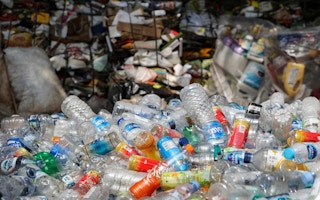The Malaysian government is preparing to transition the country’s manufacturing industry from a voluntary to mandatory extended producer responsibility (EPR) scheme over a three to five-year timeframe, according to a new national circular economy framework for the sector.
To continue reading, subscribe to Eco‑Business.
There's something for everyone. We offer a range of subscription plans.
- Access our stories and receive our Insights Weekly newsletter with the free EB Member plan.
- Unlock unlimited access to our content and archive with EB Circle.
- Publish your content with EB Premium.
The Ministry of International Trade and Investment (MITI) said that it would take a “progressive approach” to introduce EPR in relevant industries, such as the electrical and electronics and packaging sectors.
EPR schemes are used to ensure that producers take responsibility for the entire life cycle of their products, from their production to their eventual disposal, explained MITI minister Tengku Zafrul Tengku Aziz at the launch of the framework on Thursday.
“For far too long, waste and pollution management has generally been the responsibility of the government,” said Tengku Zafrul. “But achieving net zero by 2050 must take a whole-of-nation approach.”
The manufacturing and construction sector is the third largest source of the country’s greenhouse gas emissions at 9 per cent of total emissions, after energy and road transportation.
He added that the aim of Malaysia’s EPR is not to penalise producers, but for them to incorporate the cost of environmental management into the production process, incentivising more sustainable manufacturing practices.
“MITI will contribute to the EPR rollout by conducting early engagement with industry to inform them of the upcoming policies and assisting industry groups in the establishment of a producer responsibility organisation (PRO) within target sectors, such as packaging and E&E,” it said in the framework.
The ministry will also support pilot studies on EPR implementation, which would include financial assistance for small and medium enterprises through mechanisms such as tax exemptions, it said.
The new framework by MITI complements a national circular economy blueprint published last month by Malaysia’s Ministry of Housing and Local Government, which aims to implement EPR for packaging by addressing post-consumer solid waste.
At the same time, the Ministry of Natural Resources and Environmental Sustainability is exploring EPR for select consumer electronics categories. NRES minister Nik Nazmi Nik Ahmad recently described EPR as the best tool the government can use to ensure that producers play a role in achieving sustainability.
The introduction of MITI’s EPR policy was welcomed by industry players, which have long considered the lack of legislation a barrier to effective circular product design and recycling efforts.
“It is encouraging to see that EPR policies and frameworks are…becoming legislation and being made mandatory,” said Roberto Benetello, chief executive officer at the Malaysian Recycling Alliance (Marea). The alliance is a voluntary PRO for the fast-moving consumer goods sector with members including Unilever, Spritzer, Tetra Pak, Mondēlez, Colgate-Palmolive and Nestlé Malaysia.
Infrastructure lacking
However, challenges remain when it comes to ensuring more circular design and production in Malaysia’s manufacturing sector. Speaking at a panel discussion following the framework launch, he said that a major barrier is a lack of infrastructure for collecting and recycling packaging waste, leading to a low supply of secondary raw materials. “We need to develop the market for secondary raw materials [and] we need to deal with all types of materials, not just the easy-to-recycle hard plastic,” he said.
To address this, MITI is preparing to implement several major “needle-mover” policies. The first is the development of a taxonomy to help companies and investors identify what counts as a circular economy investment, said Aedreena Reeza Alwi, senior director of MITI’s delivery management unit for the ministry’s New Industrial Master Plan.
“Many of the investments that are coming into [Malaysia’s manufacturing sector] are focused on recycling, whereas we know that in a circular economy, recycling is only the last piece of the puzzle,” she said. A taxonomy will help the industry identify activities that could be targeted as circular economy investments, including improving product lifecycle design.
Another crucial policy is the implementation of a minimum circular content in manufactured products, which would require producers to use a minimum percentage of recycled raw materials, said Aedreena. However, this initiative will likely require more time and effort to prepare the industry for. “We don’t currently have enough waste to recycle back [into products], or if we do they are…exported out of Malaysia to meet minimum circular content requirements in other parts of the world,” she said, emphasising the need for regulation.
“That’s why [MITI’s] policy is supporting the local housing ministry’s policy on solid waste management, because we need to increase the recycling rate,” Aedreena added. Malaysia’s domestic recycling rate is currently around 35 per cent. The country has set a domestic recycling target of 40 per cent by 2025.
In the meantime, the ministry urges manufacturers to consider how they will prepare themselves for the eventual implementation of policies under the framework. “You have to start thinking about how you will redesign…your production processes to consider the minimum circular content policy when we put it in place eventually,” she said.

















